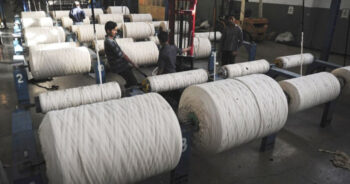 Following the failure of the government to get a nod from the IMF to restructure the power tariff, the textile industry has become agitated and warned of massive closure of the industrial units on account of the existing highest electricity tariff of 14 cents per unit.
Following the failure of the government to get a nod from the IMF to restructure the power tariff, the textile industry has become agitated and warned of massive closure of the industrial units on account of the existing highest electricity tariff of 14 cents per unit.
“If the industrial tariff earlier worked out in the range of 18.5-11.75 cents per unit by the power division supported by SIFC (Special Investment Facilitation Council) which was part of the new power tariff regime was not given a go-ahead, then the country’s industrial sector cannot thrive as over 50 percent of firms in the textiles and apparel sector are at high risk of shutting down over the coming weeks which will cause widespread unemployment and social unrest,” says Shahid Sattar, Secretary General of All Pakistan Textile Mills Association (APTMA).
APTMA, in separate letters written on Wednesday to two top ministers of the caretaker regime — Federal Energy Minister Mr Muhammad Ali and Federal Minister for Commerce, Industries, investment and Interior Dr Gohar Ejaz, drew attention towards the appalling situation of the export and non-export industry.
The Power Division had carved out the new power tariff regime under which the cross-subsidy from the domestic consumer using up to below 400 units a month would be withdrawn and in return, the power tariff for the industrial sector would be reduced to 18.5-11.75 cents per unit.
The industrial sector, the officials said, is factually giving Rs244 billion cross-subsidy to lifeline, protected, and non-protected consumers up to those who use less than 400 units a month. The withdrawal of Rs222 billion in cross-subsidy will help reduce the tariff of the industrial sector in the range of 8.5 cents per unit to 11.75 percent. This will ensure the start of industrial growth across the country. However, withdrawal of cross-subsidy will increase the power tariff of domestic consumers who are getting cross-subsidy.
However, the fund has not approved it putting the country’s industrial growth in a danger zone as it could not compete with the products of Bangladesh, Vietnam, and India in the international market because of the highest tariff in the region.
APTMA sought the emergent meeting of industry leaders from the textiles and apparel sector with the two ministers at the earliest pleading that the export industry is dying and Pakistan is continuously losing global market share.
APMTA argued that the international competitiveness of Pakistan’s textiles and apparel exports is being continuously eroded by ever-increasing energy prices that are, on average, over twice those in competing countries, and merits your urgent attention.
“Electricity prices for industrial consumers are hovering at 16.7 cents/kWh and the price of gas is being increased to Rs. 2,950/MMBtu from Rs. 2,200/MMBtu at present and Rs. 852/MMBtu a little over a year ago.”
Production at these rates is not financially feasible and the sector’s exports have become stagnant as we lose market share to regional economies like Bangladesh, India and Vietnam that have significantly lower energy tariffs. At the same time, the country’s macroeconomic outline remains weak as high inflation continues to persist, and the external sector remains vulnerable with no improvement in foreign exchange earnings.
The economy is stuck in a wholly unsustainable situation where industrial activity is shrinking with every passing day, with further implications not just for employment and poverty but also for power sector revenue and the government’s fiscal position.
With industrial power consumption declining since at least Q2FY24, industrial contribution to the fixed costs of the power sector has also declined such that it has necessitated an increase in the power tariffs of all other consumer categories, as reflected in the quarterly tariff adjustment (QTA) for the current quarter.
This will likely cause a further decline in industrial power consumption and necessitate further increases in power tariffs for all consumers. We are stuck in a vicious cycle of declining consumption and increasing tariffs with no end in sight.
The industry can no longer bear the burden of paying for cross-subsidies to nonproductive sectors in their energy tariffs. These cross-subsidies are an economic distortion that cannot be exported and therefore significantly weighs down on the international competitiveness of Pakistan’s manufacturing sectors.





















